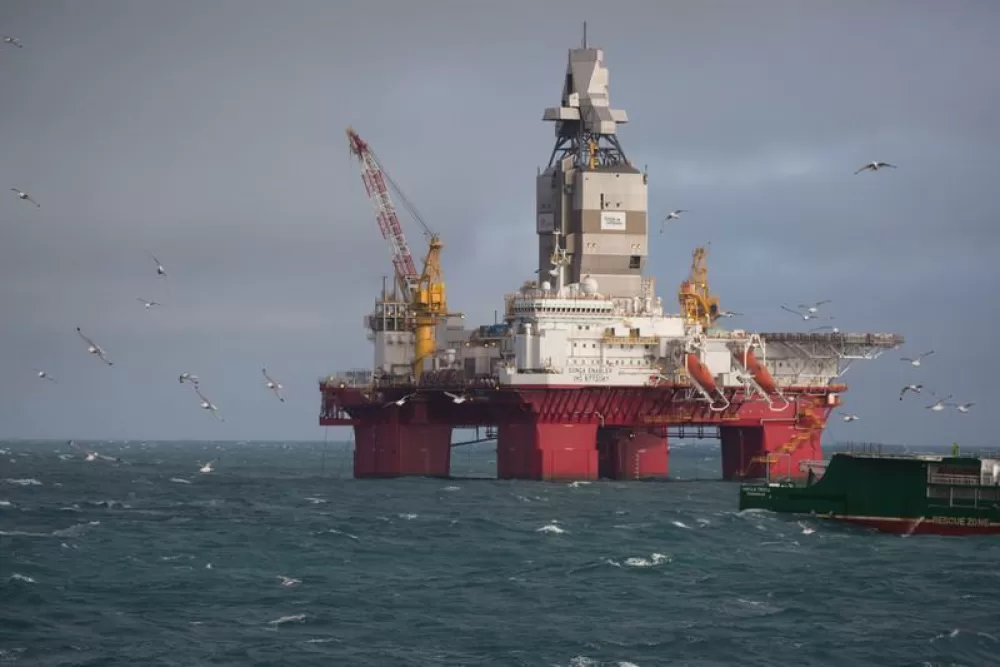 |
| Norway’s Supreme Court will rule on whether the country can issue licenses for further oil and gas exploration in the Norwegian Arctic. In fact, this major lawsuit is challenging the expansion of the country’s petroleum industry to the southern and southern eastern areas of the Barents Sea, an expansion that was supported unanimously by the Norwegian Parliament on June 10, 2016, 10 days before Norway ratified the Paris Agreement.
Hvorfor på engelsk?
Det er stor interesse i andre land for det norske klimasøksmålet. Pan ønsket derfor å gi en plattform for denne teksten som sammenfatter saken.
The case deploys for the first time Article 112 of the Norwegian Constitution, one of the strongest constitutional provisions worldwide on the right to a healthy environment, including for future generations; the long-term and comprehensive management of natural resources to preserve biodiversity and productivity; and the duty on public authorities to take implementing measures to these ends. Moreover, the plaintiffs, Greenpeace and Nature and Youth, asked for the invalidity of the expansion decision based on violations of such statutes as the Public Administration Act and the Petroleum Act.
In the first round of the lawsuit (2017), the Oslo District Court examined the preparatory works in the constitutional provision, as well as doctrine, and concluded that Article 112 is clearly a rights provision that individuals and NGOs can invoke in court. But the Oslo District Court set the review threshold extremely high, allowing for wide governmental discretion. Such discretion was justified both as a general hands-off stance that courts shall hold in climate policy matters, but also based on the Parliament’s involvement in the decision-making process, providing the decision with a supposedly stronger democratic basis. Similarly did the Oslo Court of Appeals in the second round of the lawsuit (2019).

About the author
Esmeralda Colombo is an Affiliate at the Centre for Climate and Energy Transformation at the University of Bergen and Attorney and Counselor at law in New York State. Her PhD dissertation at the University of Bergen centered on access to justice in climate change cases.
In both instances, the courts largely neglected the argument by which the government and Parliament had incurred blatant mistakes on the profitability of the industry in the future. The duty to gauge whether the Norwegian government will be able to recoup costs to develop the sites is encased in Norwegian law. The decision to open for new petroleum fields was itself meant to provide the Norwegian society with a long-term profitable petroleum industry (Meld. St. 36, p. 5). But researchers showed that the government had grounded its profitability projections for the southeastern Barents Sea on unrealistic and mistaken assumptions. To wit, from a socio-economic perspective, reports displayed that to drill in the Arctic could amount to a liability of minus 2 billion Norwegian crones for Norway’s present and future generations.
In the recent waltz of events, just a handful days ahead of adjudication before the country’s Supreme Court, the Norwegian government finds itself in a difficult situation. What first seemed as sloppy and unrealistic projections made by the government, and unchecked by courts, have arisen to the rank of a “political cover-up.” Unusual to a political culture often trusted by citizens, it appears that some officials in Norway’s Ministry of Oil and Energy have silenced reports from Norway’s Petroleum Directorate showing the possibility of massive losses from the Arctic expansion. The Ministry’s mandate to the Directorate was thus to silence costs and pass on “fake news” to Parliament, based on uncomprehensive analyses.
Unusual to a political culture often trusted by citizens, it appears that some officials in Norway’s Ministry of Oil and Energy have silenced reports from Norway’s Petroleum Directorate showing the possibility of massive losses from the Arctic expansion.
What the Directorate’s reports pointed out is consequential. If the oil price sank by 30%, and costs were kept equal, the net value of developing petroleum fields in the southeastern Barents Sea would have been negative. Meaning that Norway’s present and future generations would need to foot the financial bill, and bear the environmental consequences of an unprofitable development of the petroleum industry in one of the most pristine environments on earth. It is worth recalling that the Arctic winter warming is projected to be around 0.5-5°C even if the world meets the Paris upper-range target of limiting warming below 2°C. If the oil price supporting the government’s reckonings in the Arctic expansion decision was $120 a barrel, the oil price has now sunken to around $40 a barrel, a decrease by 66%.
What will happen now?
It is not credible to justify the political cover-upas based on data uncertainty. As the news on the national broadcaster NRK report, many employees at the Petroleum Directorate sat uneasily with the Ministry of Oil and Energy’s interference with their report. The report was meant to be evidential and non-political, and disclosing the risk of net losses was necessary from a scientific viewpoint.
I envisage at least two consequences:
1) Norway’s Supreme Court, now hearing the case in full bench, cannot neglect the profitability argument brought by plaintiffs ever since the start of the lawsuit. The government was under a legal duty to disclose all information to the Parliament in the voting process, and to the plaintiffs in the course of the lawsuit. Moreover, the Supreme Court will need to assess whether the lack of disclosure by the government, allegedly imputed to an “error,” is fraudulent, consequential, and whether it shall be sanctioned;
2) The public debate on the “Norwegian paradox” is revamped. Under the Norwegian paradox, Norway is a climate leader in international fora, and a petrostate at home, maintaining its status as the seventh largest exporter of emissionsin the world. The government’s recent proposal to open 125 new exploration blocks in the Barents Seaand the coronavirus brown package, giving petroleum companies huge tax breaks, will likely be under the spotlight again.
As Hannah Arendt wrote in Crises of the Republic (1972), contingent facts are vulnerable. They entail no a priori truthfulness because facts need individuals that are capable to witness and talk about them. Therefore, the way forward to learn from this scandal is for society as a whole to witness and talk about evidential facts, these facts on climate policy in the Norwegian Arctic, recognizing the true value of science and facts. The next few weeks will let us see how contingent facts will emerge in the Norwegian Climate Case before the Supreme Court, a case not to be missed.
Read more
Read all our texts on the climate lawsuite here (in Norwegian).


